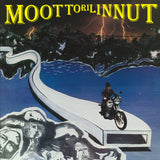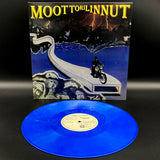Ocean blue marble vinyl.
With the release of an EP and two full-length albums between 1979 and 1980, guitarist Kimmo Kuusniemi, known for the crude amateur pyrotechnics of the flamethrower guitar he wielded on stage, had established his band Sarcofagus as one of the few heavy metal acts in Finland, and certainly the most innovative and intriguing. At the time, Kuusniemi had a job doing PR and sales analysis for JP-Musiikki OY, the record label that released the first two Sarcofagus records. By 1981, Kuusniemi was working on a new album, but the label was skeptical of the band’s prospects. Leery of the name Sarcofagus, the label insisted on using “Kimmo Kuusniemi Band” for the next release—a demand to which Kuusniemi begrudgingly acquiesced. It was just one of several necessary concessions Kuusniemi would make in order to bring the “Moottorilinnut” album into existence. Despite the name change, the inclusion of keyboardist Esa Kotilainen and bassist Juha Kiminki, both of whom appeared on the two previous Sarcofagus albums, maintained continuity for the band. For the vocals, Kuusniemi sought out singers Kirka Babitzkin and his sister Muska, who had been popular in Finland since the 1970s but had never recorded any sort of heavy rock music. Kuusniemi reached out to Kirka expected him to decline the invitation. But to Kuusniemi’s surprise, Kirka and Muska both agreed to participate, with Kirka contributing vocals on two tracks (“1000 megawatin totuus” and “Veistoksen ajatuksia”) and Muska adding her energetic voice to three others (“Metallinen sateenkaari,” “Elävien hautausmaa,” and “Megakone”). A third unknown but highly talented vocalist named Jukka Ritari sang the remaining three songs. When writing the lyrics, Kuusniemi departed from the Ancient Egyptian themes that permeated his earlier work, focusing instead on more contemporary and existential subject matter. While working on the album, Kuusniemi became inspired to make videos for the tracks—not just live performance-style videos, like those he made for the previous album, but more conceptually tied to the songs. He sought out a couple of other young filmmakers and set about creating videos to accompany each of the tracks, which ultimately proved to be a massive undertaking. But Kuusniemi realized his vision in the end, creating a full length video to accompany the album. Kuusniemi acknowledges that “Moottorilinnut” was a bit “too much” for people back then, with its unpopular heavy metal sound, three different vocalists, Finnish lyrics, unsuitable cover art, and music videos for each of the tracks. But the passage of time has benefitted “Moottorilinnut,” garnering legions of new fans with a series of Sarcofagus reissues and a complete reevaluation of Kuusniemi’s legacy. Indeed, for many fans of Kuusniemi’s work, “Moottorilinnut” is his magnum opus. With its use of the Finnish language, the involvement of some of Finland’s most famous singers, it has come to be recognized as a defining work in the canon of Finnish heavy metal and one of the most unique metal albums of the era in general.




